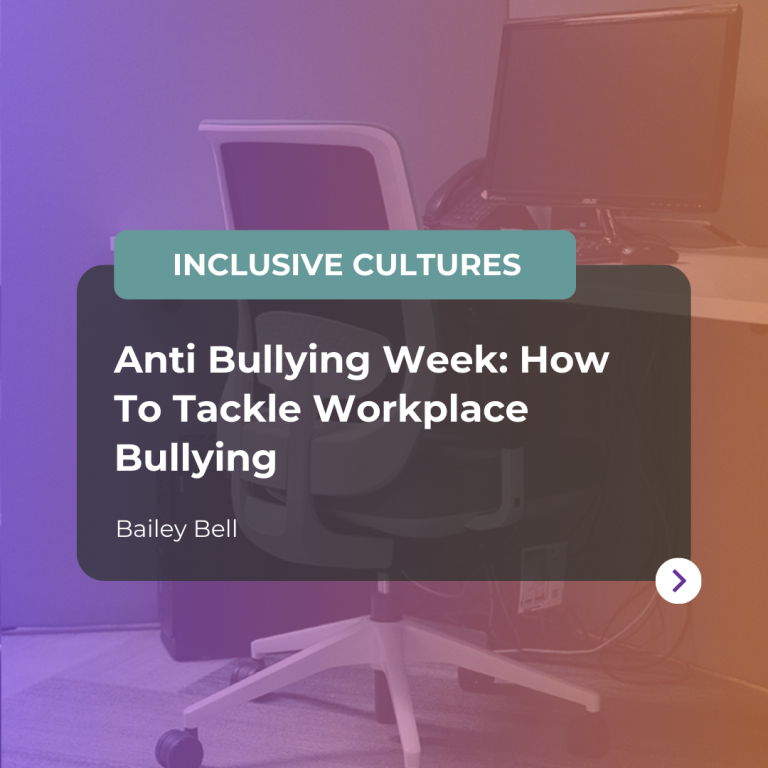While many organisations want to believe their organisation is free of bullying and other types of inappropriate behaviour, it’s unfortunately more common than we often think.
Workplace bullying can have a major negative effect on your company culture, employee wellbeing, satisfaction, and performance. Not to mention your reputation and ability to attract diverse and quality talent.
This week is Anti-Bullying Week, and an opportune time for organisations and individuals alike to consider the actions that you can take to improve your culture by tackling exclusive behaviours such as bullying.
In this article, I will share three ways that you can tackle bullying and improve the culture in your workplace:
1. Be proactive
Often the approach to anti-bullying and other factors around inclusion is reactive rather than proactive. This means that the focus is on dealing with the behaviour after the fact – rather than creating the conditions to prevent the exclusive behaviour taking place in the first place – which can erode your culture and staff wellbeing before you even have the opportunity to deal with it.
To effectively deal with inappropriate behaviour you should be proactive, for example by:
- Creating a clear anti-bullying policy and socialising this with staff in different mediums so they are clear on what is and is not acceptable.
- Regularly conducting pulse checks to understand the experiences of your colleagues.
- Upskilling your team around inclusive behaviours such as micro-affirmations and encouraging them, so that they become normalised.
- Ensuring that there is psychological safety in your teams, so people feel comfortable to speak up.
2. Equip yourself and colleagues to challenge inappropriate behaviour
While it is important to be proactive and take steps to minimise the risk of bullying, there will still be times where you or your colleagues may encounter bullying behaviour. Therefore, it is important to ensure that everyone is equipped to challenge exclusive behaviour, and to feel comfortable doing so.
There are a variety of ways to do this, but what we do know, based on our own research and experience, is that it helps to provide individuals with insight into their own inclusivity, which will heighten their awareness of their judgements and behaviours. They should also be given practical techniques to challenge such behaviour and opportunities to practice doing this.
Often people do not challenge bullying because they are not sure how to, or they are fearful of the consequences, or of coming across as confrontational. However, there are many techniques that can be used to gauge the right level of challenge, and to do so effectively requires practice.
A good step for any organisation to take is to provide interactive programmes and create bite-sized guides or playbooks to support staff to challenge behaviour effectively.
3. Provide clear guidance and support resources
Unfortunately, many organisations create a bullying and harassment policy simply because it is expected, but do so as a tick box exercise to satisfy compliance and suppliers that they’re ethical. However, because this is often the spirit in which the policy is created it is often not visible (e.g., only in the staff handbook) which means that staff are not living and breathing the policy. Thus, when an incident occurs, staff are sometimes at a loss as to whether the behaviour was inappropriate or not, how to deal with it, and what support might be available to them. As a result, the policy and processes that organisations design may not be as effective as they could be.
Your bullying and harassment policy should be clear and accessible to all which will increase the likelihood of it being embedded across your organisation. As well as stating the behaviours that are unacceptable, you should provide examples of behaviours that encourage inclusion. There should be clear guidance on how to report instances of bullying and resources to support individuals to challenge bullying behaviours, report them, and deal with the impact.
One thing that may help here is using space on your intranet and/or newsletters to share information about your anti-bullying policies and practices.
Using the 3 steps shared above will set you in good stead to improve your culture and set the standard for behaviour in your organisation, not just during Anti-Bullying Week but for years to come. We encourage you to use this guidance to further your approach to bullying and other types of exclusive behaviours.
At Pearn Kandola we have significant experience partnering with organisations to equip them to be able to be proactive in tackling exclusive behaviours. You can see an example of this work in our case study with Active Bystander NHS England and Improvement.
If you are interested in exploring how we can support your team to tackle exclusive behaviour, please contact Bbell@pearnkandola.com.






